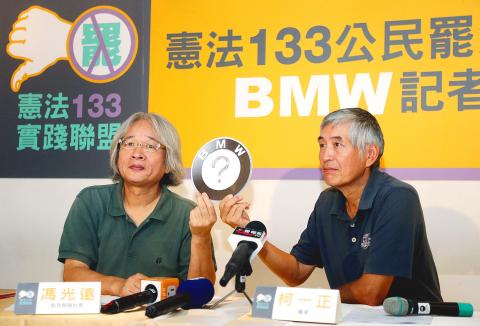|
Alliance names
lawmaker as first candidate for recall
THRESHOLD: The Constitution 133 Alliance accused
KMT Legislator Wu Yu-sheng of nine ‘bad deeds,’ including opposing the movement
against monopolization of the media
By Chris Wang / Staff reporter

Neil Peng, left, and film
director Ko I-chen, the initiators of the Constitution 133 Alliance hold up a
sign with the letters BMW during a press conference yesterday. The letters stand
for bamian wu, which is Chinese for “recall Wu [Yusheng].”
Photo: CNA
Chinese Nationalist Party (KMT) Legislator
Wu Yu-sheng (吳育昇) was yesterday named as the first candidate for a civic group’s
recall campaign because of his consistent alignment with President and KMT
Chairman Ma Ying-jeou (馬英九) rather than with the public he is meant to serve,
according to the group.
The Constitution 133 Alliance, recently established with the goal of recalling
legislators it sees as incompetent, told a press conference that it would soon
launch a recall campaign against Wu, a former KMT caucus whip who is known to be
one of Ma’s confidants.
“Recalling Wu will be a difficult task, but we’re still going to try to
accomplish what would be the first time in history that Taiwanese exercise their
right to recall elected officials,” said award-winning author Neil Peng (馮光遠),
one of the founders of the alliance.
Recalling Wu requires the support of at least one-half of the eligible voters in
his constituency, which includes six New Taipei City (新北市) districts: Sanjhih
(三芝), Shihmen (石門), Tamsui (淡水), Bali (八里), Linkou (林口) and Taishan (泰山).
Before that, the alliance would have to collect the signatures of at least 2
percent of the total electorate in Wu’s district to propose the bid and the
joint petition from another 13 percent of the total voters for the proposal to
be legitimate.
However, the alliance was determined to initiate the campaign nicknamed the “BMW
Movement,” which Peng said stood for bamian Wu (罷免吳), which means “recall Wu” in
Chinese.
The nickname also refers to Wu’s extramarital affairs, reported in November
2011, when the lawmaker was photographed by the media in a BMW sports utility
vehicle with his mistress.
The alliance accused Wu of nine “bad deeds,” including providing staunch support
to Ma’s unpopular policies on electricity and fuel price increases, nuclear
energy and US beef imports, as well as his pro-China position and opposition to
the movement against monopolization of the media.
Because the threshold of recalling a president is high, the alliance said it was
forced to resort to recalling lawmakers to express the public’s anger about the
way the administration was ignoring its mandate.
“In unusual circumstances, people have no choice but to resort to unusual
measures,” film director and alliance co-founder Ko I-chen (柯一正) said.
The alliance said the recall campaign against Wu was only the beginning, but did
not disclose the next step.
KMT lawmakers are likely to be primary targets as the KMT caucus was the only
party caucus which refused to sign letters of commitment sent by the alliance to
distance itself from Ma.
Huang Kuo-chang (黃國昌), a researcher at Academia Sinica, expects the alliance to
launch the signature drive at about the start of the next legislative session
next month and the best time to vote on the proposal would be in early December.
However, the alliance faces time constraints as it only has one month to collect
the signatures of 13 percent of the total voters once it secures the 2 percent
to initiate the proposal, which was why it called for people to volunteer for
advocacy works and collecting signatures.
“The best scenario would be for the campaign to create pressure on KMT lawmakers
in the new legislative session and force the KMT to change its position on the
construction of the Fourth Nuclear Power Plant in New Taipei City’s Gongliao
District (貢寮), and the cross-strait service trade agreement,” Huang said.
If that occurs, “the Taiwanese win even if the recall campaign fails,” Huang
said.
|
![]()
![]()
![]()